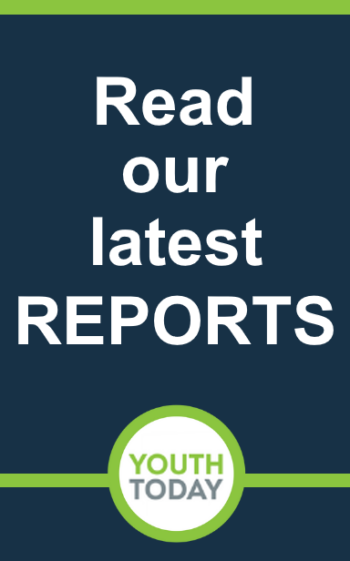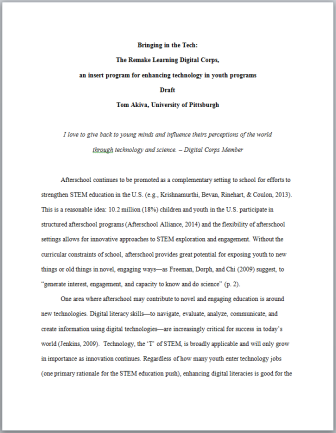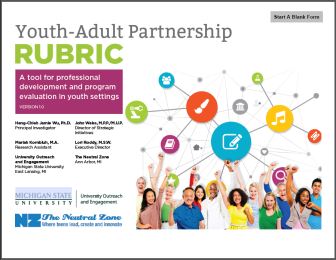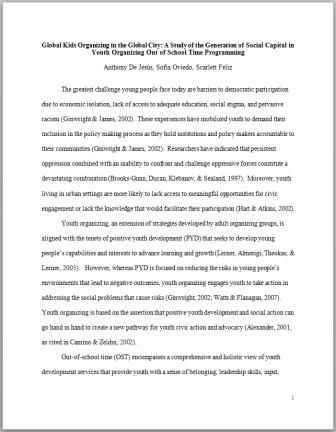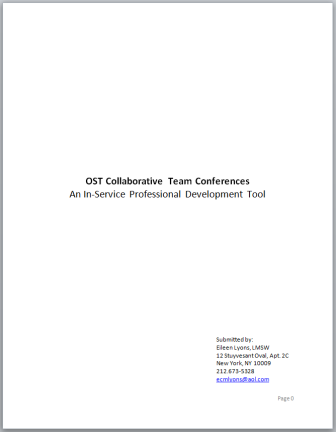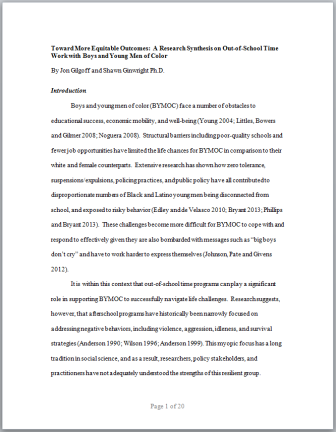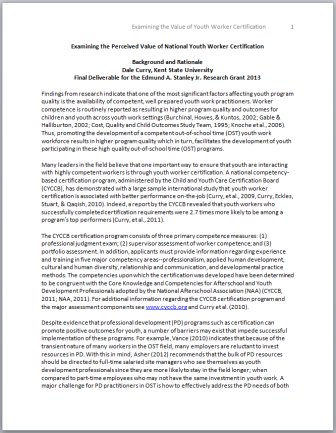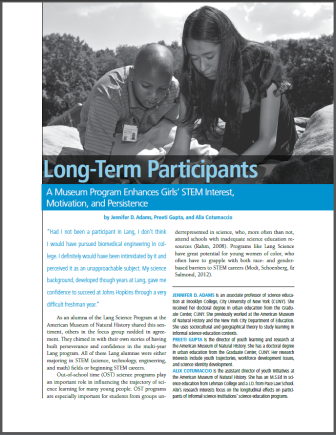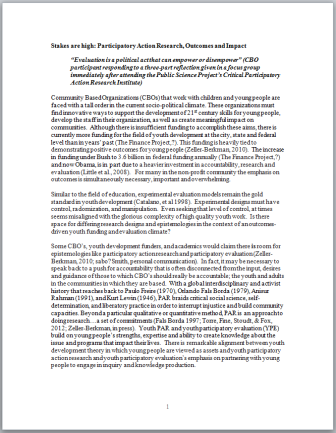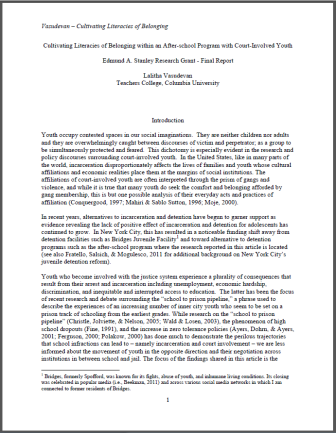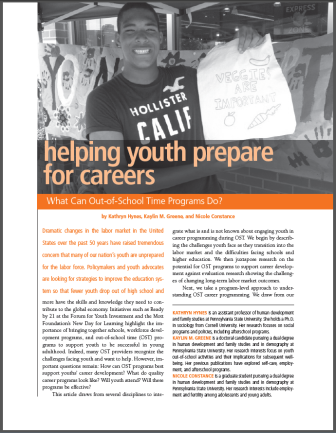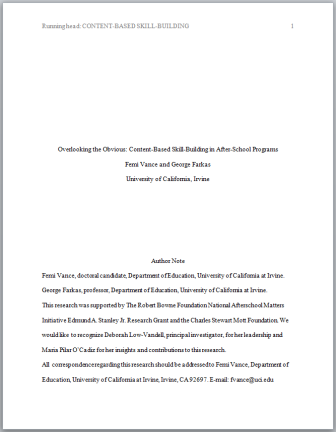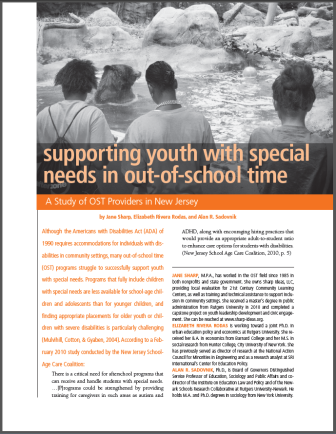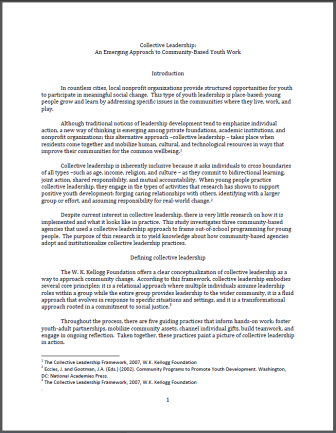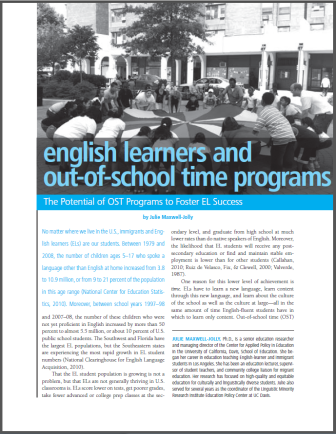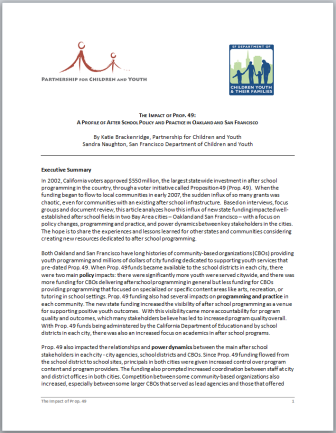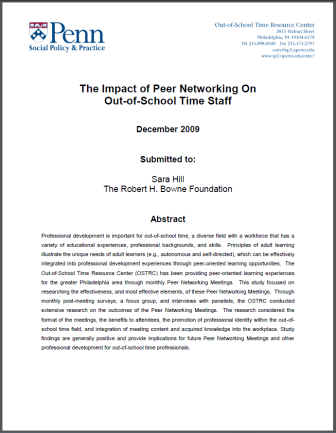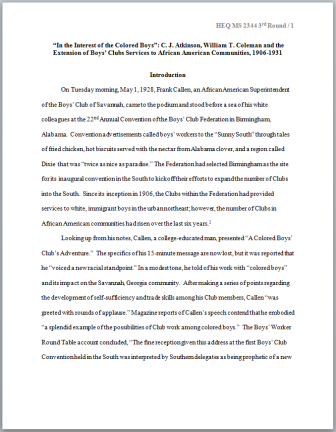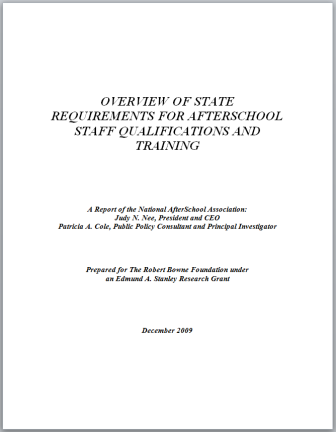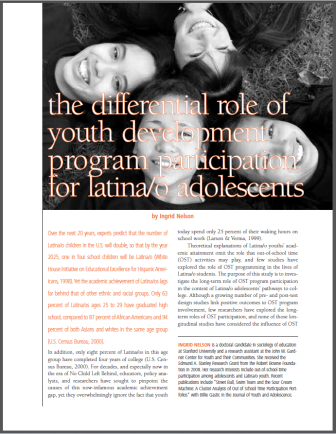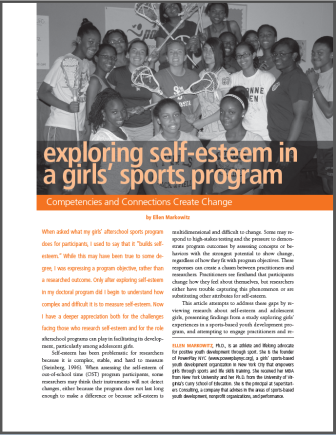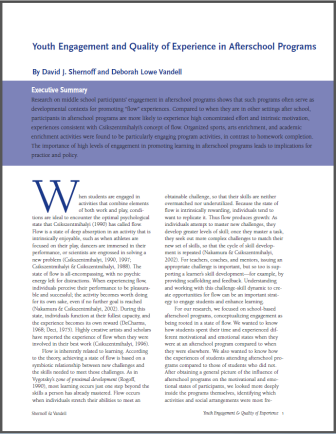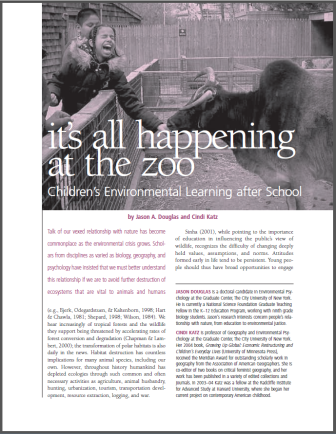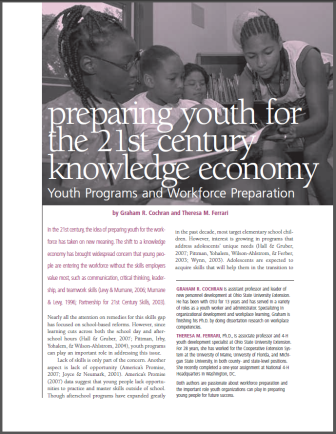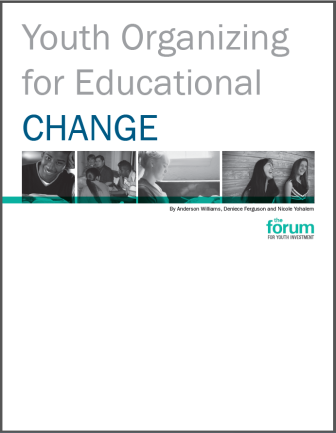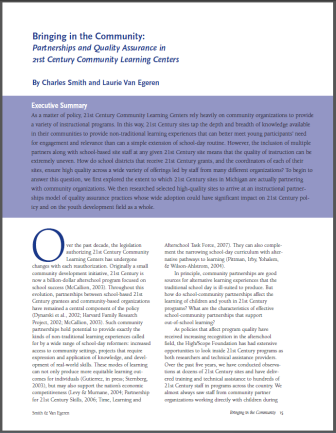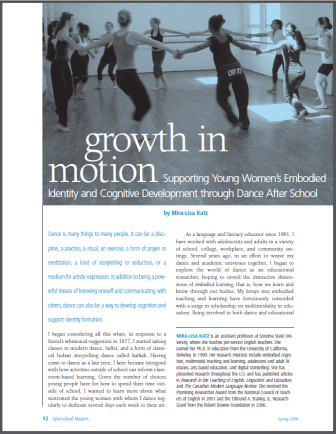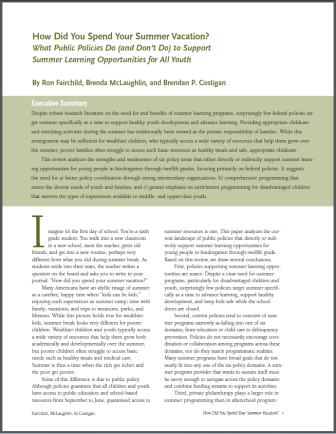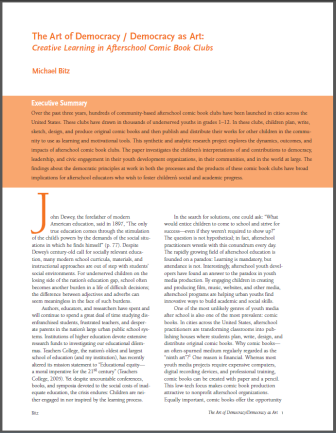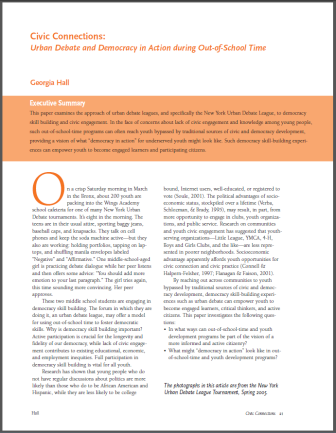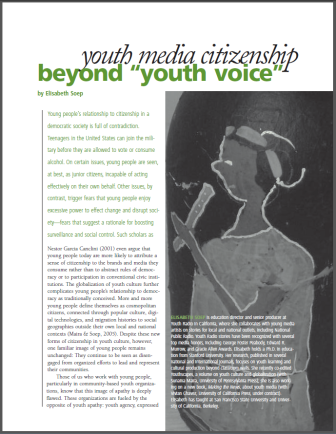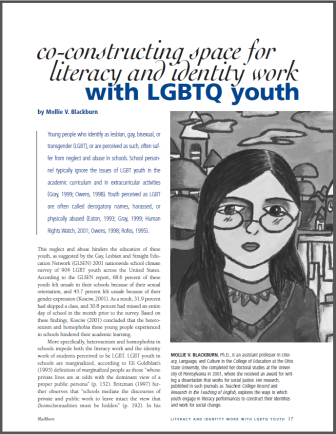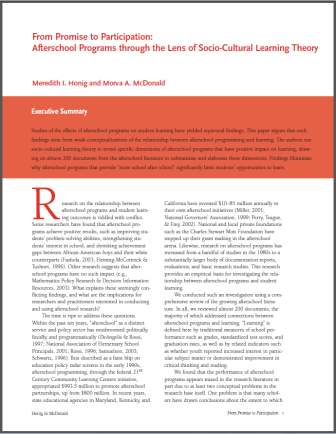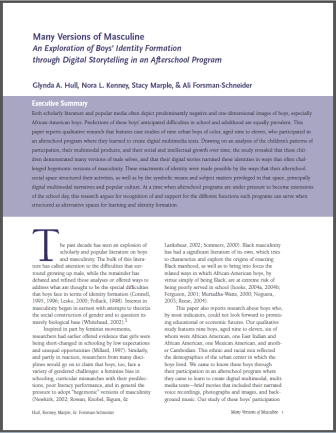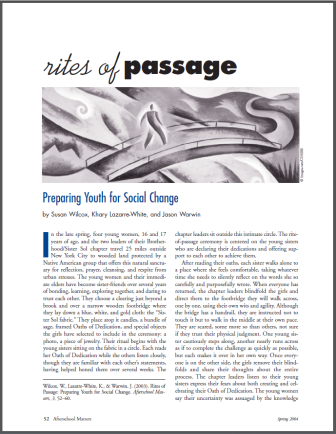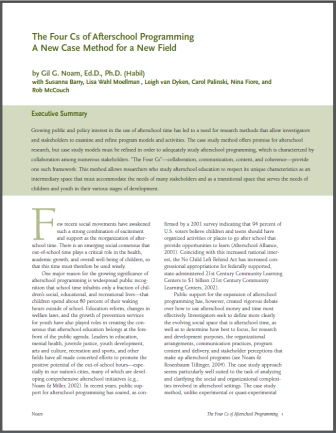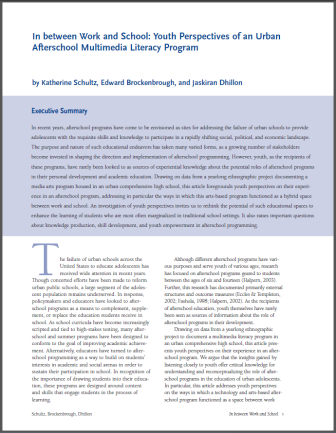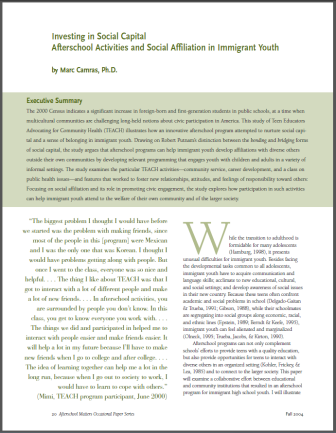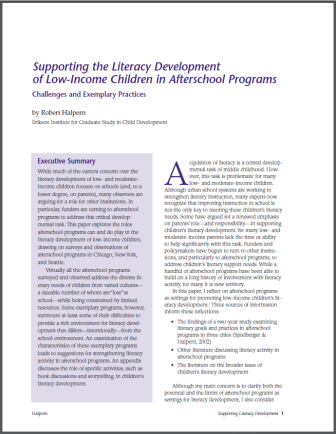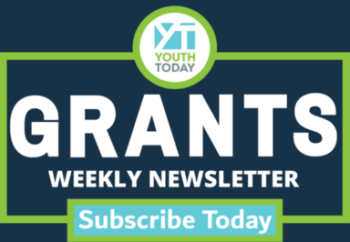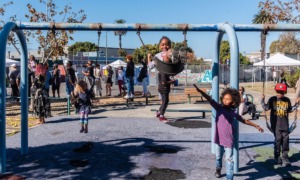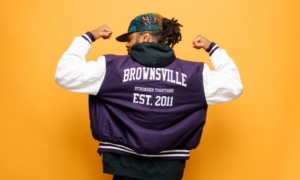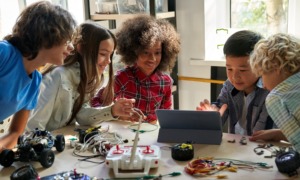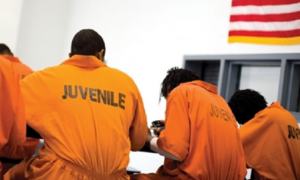This section provides a description of each Edmund A. Stanley Jr. grant made between 2003 and 2015, as well as a link to the final product that was generated by the grant. In some cases the product is a research report, in other cases it is an article that appeared in the journal, Afterschool Matters.
The section is divided into the following grant years:
2014
Bringing in the Tech: The Remake Learning Digital Corps
Tom Akiva , University of University of Pittsburgh. This research explored professional development (PD) for non-youth workers who deliver content-based workshops in afterschool through the Pittsburgh Digital Corps (a national MacArthur-funded project called the HIVE). The studied cohort was a “Corps” of adults hired because of their technology expertise and trained to deliver particular technology-based content, and then deployed to lead workshops in existing afterschool programs for tweens and teens. One of their research questions was “What process-based elements (e.g., classroom management) are needed to supplement the content-driven PD?”
Youth-Adult Partnership Rubric
Heng-Chieh Jamie Wu, Michigan State University. This study focused on youth-adult partnerships (Y-AP) which emphasize youth and adult staff as partners and encourages youth to serve meaningful leadership roles. The study will use a research-based Y-AP framework; a) authentic decision-making, (b) natural mentors, c) reciprocal activity, and d) community connectedness. The study will document the observable behaviors demonstrated between youth and adult staff that represent these Y-AP practices. This study will be conducted at The Neutral Zone — a teen center in Ann Arbor, Michigan. An end product of this study will be a Y-AP rubric that will inform the field and be used as a staff self-assessment tool.
2013
Global Kids Organizing in the Global City: A Study of the Generation of Social Capital in Youth Organizing Out of School Time Programming
Anthony de Jesus, Assistant Professor, Silberman School of Social Work, Hunter College, CUNY. Sofia Oviedo, Global Kids, New York. This project researched youth organizing at afterschool programs that fostered youth civic engagement, policy advocacy, and the improvement of environmental conditions in the communities of Queens, New York. The research project studied various dimensions of youth organizing within a community-based Out-of-School Time (OST) setting as a model for youth civic engagement. Participating youth served as advisers and informed the development of research questions and data collection.
OST Collaborative Team Conferences: An In-Service Professional Development Tool
Eileen Lyons, Fresh Youth Initiatives. This research project examined the impact of staff members’ participation in ‘structured student conferences’ on their skills as youth practitioners working in Out-of-School Time settings. The project assessed whether staff conferences – which provide a structured guideline and protocol to guide staff members’ thinking and reflection about a child – is an effective professional development tool and its role in practice change and improvement.
Toward More Equitable Outcomes: A Research Synthesis on Out-of-School Time Work with Boys and Young Men of Color
Belinda Reyes, Director, César E. Chávez Institute, Associate Professor, Latina and Latino Studies Department, San Francisco State University. Jon Gilgof, Executive Director, Brothers on the Rise San Francisco, CA. The research team wrote a synthesis of the existing literature on Out-of-School Time work with school-aged male youth of color. The goal of the study was to provide practitioners and OST administrators with in-depth analyses of key findings, trends, and opportunities within the research literature. The end product will be a “user friendly” practical guide on how to implement culturally responsive and appropriate programs strategies as part of afterschool and summer initiatives.
2012
Examining the Perceived Value of National Youth Worker Certification
Dale Curry, Kent State University, International Institute for Human Services for Workforce Research and Development. Using existing data gathered from a national youth worker certification exam validation study, this research explored similarities and differences in the perception of the certification process and its impact on performance for community-based versus out-of-home care workers. The study used data from supervisors of participating workers as well as interviews with workers to ascertain their perceptions of the process. This was compared to data from workers who did not complete the process to determine barriers for completion.
Long-Term Participants: A Museum Program Enhances Girls’ STEM Interest,
Motivation, and Persistence
Jennifer Adams, Brooklyn College, Preeti Gupta, American Museum of Natural History, NY. This was a study of students from underrepresented communities who participated in a continuum of Out-of-School Time (OST) activities over a ten-year period at the New York Hall of Science. Through interviews, observations and various artifacts produced during their participation, the study investigated if students persevered in science, what specific challenges they faced in relation to pursuing science, and how their participation might have helped them to negotiate these challenges.
Stakes Are High: Participatory Action Research, Outcomes and Impact
Sarah Zeller-Berkman, The Public Science Project, CUNY Graduate School. This research studied the impact of a professional development opportunity, a five-day institute on Critical Participatory Action Research (PAR) with youth-serving organizations. The research goals included gaining a better understanding of participants’ engagement in PAR, how participants implemented a more participatory orientation to their work with youth, as well as impact on youth.
2011
Cultivating Literacies of Belonging within an After-school Program with Court-Involved Youth
Lalitha Vasudevan, Teachers College, Columbia University. The Re-imagining Futures Project studied of how court-involved adolescents experience and interpret their everyday realities as they navigate the institutions of justice and education. In addition, the study examined how the arts can support critical inquiry and help youth re-imagine their futures outside of correctional control.
Helping Youth Prepare for Careers: What Can Out-of-School Time Programs Do?
Sarah Zeller-Berkman, The Public Science Project, CUNY Graduate School. This research studied the impact of a professional development opportunity, a five-day institute on Critical Participatory Action Research (PAR) with youth-serving organizations. The research goals included gaining a better understanding of participants’ engagement in PAR, how participants implemented a more participatory orientation to their work with youth, as well as impact on youth.
Overlooking the Obvious: Content-Based Skill-Building in After-School Programs
Deborah Vandell, Femi Vance, University of California, Irvine. This study explored how program quality is related to adolescents’ attendance, and to understand which quality features can sustain attendance in youth programs. The study used an existing dataset to examine the structural quality features that can predict attendance over a two year period.
Supporting Youth with Special Needs in Out-of-School Time: A Study of OST Providers in New Jersey
Dr. Alan Sadovnik, Rutgers University. The research collected data and analyzed issues relating to professional development of OST practitioners specific to the inclusion of children with special needs and resulted in a paper containing policy recommendations as well as suggestions for Out-of-School Time administrators and staff.
2010
Collective Leadership: An Emerging Approach to Community-Based Youth Work
Carla Roach, Innovation Center for Community & Youth Development. This research project investigated community-based youth agencies and their potential to catalyze a collective leadership approach during out-of-school time in three community-based organizations in Arizona, Connecticut, and California.
English Learners and Out-of-School Time Programs: The Potential of OST Programs to Foster EL Success
Julie Maxwell-Jolly, Center for Applied Policy in Education University of California, Davis. This was a research synthesis and literature review of research on the range of factors and strategies that contribute to improving English learners’ education outcomes as well as research on after and Out-of-School Time programs for similar evidence regarding success factors and strategies, in order to explore where the two bodies of literature intersect.
The Impact of Prop. 49: A Profile of After-school Policy and Practice in Oakland and San Francisco
Katie Brackenridge, Bay Area Partnership for Children and Youth. This project explored the impact of an increase in state funding for school-based afterschool programs on the relationships, policies, programming and afterschool practices of school districts, cities and community-based organizations.
2009
The Impact of Peer Networking On Out-of-School Time Staff
Nancy Peter, Out-of-School Time Resource Center/University of Pennsylvania. This research project examined the impact of Peer Networking Meetings on programs and participants. The study investigated how participants acquired new knowledge and skills, created and established linkages with other individuals and agencies, enhanced perceptions of professional identity, and applied these practices and perceptions to program enhancement.
“In the Interest of the Colored Boys”: C. J. Atkinson, William T. Coleman and the Extension of Boys’ Clubs Services to African American Communities, 1906-1931
Carter Savage, Boys & Girls Clubs of Northwest Indiana. This grant enabled the completion of two chapters of an historical study of how African Americans came to be served by Boys & Girls Clubs of America. The chapters described local stories: the young people, their neighborhoods, the leadership, and programs of these early Boys’ Clubs in African American communities.
Overview of State Requirements for Afterschool Staff Qualifications and Training
Judy Nee, National AfterSchool Association. This grant was for an analysis of current state requirements for after-school staff qualifications and training in federally and state-funded or regulated programs as well as selected privately funded programs. The study will help policy makers understand the current landscape of regulation related to this area, as well as synthesize requirements across states and funding streams.
2008
The Differential Role of Youth Development Program Participation for Latina/o Adolescents
Milbrey McLaughlin and Ingrid Nelson, John W. Gardner Center for the Study of Youth and Their Communities, Stanford University. This was an examination of the role of youth development program participation in the pathways to college of working class and Latino adolescents. The study examined the ways in which the value of program participation varies across youth.
Exploring Self-esteem in a Girls’ Sports Program: Competencies and Connections Create Change
Ellen Markowitz, University of Virginia, School of Education. This was an ethnographic case study that focused on understanding the social processes between adolescents and adults, and between adolescents and their peers that facilitate positive youth development for girls in an after school setting with a mentoring component.
Youth Engagement and Quality of Experience in Afterschool Programs
David Shernoff and Deborah Lowe Vandell, University of Northern Illinois. This study was part of an on-going research project on the experiential benefits of afterschool program participation, including increased engagement, intrinsic motivation, and concentrated effort. The study analyzed whether the quality of students’ experiences and mood states in afterschool programs are related to skill and initiative, social competency and social relations, destructive behaviors, and academic performance.
2007
It’s All Happening at the Zoo: Children’s Environmental Learning after School
Cindi Katz and Jason Douglas, CUNY Graduate School; Environmental Psychology, NY. This was a study of the cognitive development of youth from two Out-of-school Time programs as they participated in a structured program on natural science and conservation at the Bronx Zoo.
Preparing Youth for the 21st Century Knowledge Economy: Youth Programs and Workforce Preparation
Graham Cochran and Theresa Ferrari, Ohio State University and 4H Youth Development. This grant was for a research synthesis of youth development and workforce preparation. The synthesis reviewed literature on the skills needed in the workplace, examined existing research on Out-of-School Time programs designed to prepare youth for the workforce and methods of assessment. The resulting paper provided suggestions for how to improve the workforce preparation practices of community-based youth development programs.
Youth Organizing for Educational Change
Nicole Yohalem, Forum for Youth Investment. This study documented organizational change at two youth agencies as well as how the philosophy, focus, and structure of the organizations evolved over the years to emphasize youth-adult partnership.
2006
Bringing in the Community: Partnerships and Quality Assurance in 21st Century Community Learning Centers
Charles Smith, High/Scope Educational Research Foundation, Ypsalanti, MI. A secondary analysis of a database produced through the Youth Program Quality Assessment Validation Study. The study focused on relationships between community-based organizations and their partners in afterschool programs funded by the 21st Century Community Learning Centers. The resulting paper provides directions on how regulatory and accountability procedures can build quality in the afterschool sectors.
Growth in Motion: Supporting Young Women’s Embodied Identity and Cognitive Development through Dance After School
Mira-Lisa Katz, Sonoma State University, Rohnert Park, CA. A study of how participation in afterschool dance programs support young women’s identity development, cognitive growth and social well-being. In addition, the study explored how multi-modal approaches, such as dance, can inform and expand current teaching practices and best support positive learning experiences of high-school age youth.
How Did You Spend Your Summer Vacation? What Public Policies Do (and Don’t Do) to Support Summer Learning Opportunities for All Youth
Ron Fairchild, Center for Summer Learning at Johns Hopkins University, Baltimore, MD.
This was a grant for a research synthesis on summer learning programs, including an overview and history and exploration of summer programs’ multiple roles. The synthesis included a description of summer program models, as an examination of policies, funding and legislation that shape summer programs to be more academically oriented.
2005
The Art of Democracy / Democracy as Art: Creative Learning in Afterschool Comic Book Clubs
Michael Bitz, Teachers College, Columbia University, N.Y. This was a grant for a research synthesis on comic book clubs during the afterschool hours in four cities: New York, Philadelphia, Baltimore and Chicago. The study explores the notion that comic books produced by youth are based on themes of democracy and leadership and represent the voices of children who in any other setting would be labeled as “under-achieving.”
Civic Connections: Urban Debate and Democracy in Action during Out-of-School Time
Georgia Hall, National Institute on Out-of-School Time, Wellesley College, MA. An investigation into the approach and activities of the New York Urban Debate League, and how youth, through their participation, “develop democracy skills and experiences that can effect personal change.” The research study describes the components of the debate program, profiles youth and adult participants, provides an analysis of the approach and activities, investigates the experiences of and impacts on participating youth, and outlines the infrastructure that supports the delivery of urban debate activities.
Youth Media Citizenship: Beyond “Youth Voice”
Lissa Soep, Ph.D., Youth Radio, CA. A study of Youth Radio, an afterschool youth media program whose participants cover a range of topics and whose broadcasts are carried regularly on National Public Radio and other major outlets. The study focused on youth from five community-based youth organizations. The research studied the principles and practices which shape youth media organizations’ efforts to cover stories related to democracy and social justice; the extent to which learning environments are marked by evidence of social justice pedagogy; and the conditions needed to be in place for community-based organizations to both cover stories related to democracy and themselves to operate as democratic learning environments.
2004
Co-constructing Space for Literacy and Identity Work with LGBTQ Youth
Mollie V. Blackburn, The Ohio State University. This was a study of The Attic Youth Center, a youth-run, community-based center for lesbian, gay, bisexual, transgender, and questioning youth. The study focused on data collected during “Storytime,” a literacy event at the Center, and explored how youth, through this Out-of-School Time literacy activity, developed positive social identities. In addition, the study identified competencies exhibited during this event and explore their potential alignment with the Standards for English Language Arts.
From Promise to Participation: Afterschool Programs through the Lens of Socio-Cultural Learning Theory
Meredith Honig, University of Maryland, College of Education. A grant for a research synthesis that addressed the critical challenges for community based youth organizations that enter into formal partnerships with schools. The paper explored the gap between the promise and the practice of expanded school-linked afterschool programming, and how such partnerships can be implemented in ways that support both academic achievement and positive youth development.
Many Versions of Masculine: An Exploration of Boys’ Identity Formation through Digital Storytelling in an Afterschool Program
Glynda Hull, The University of California, Berkeley. This grant supported research that described and analyzed the social, intellectual and artistic development of youth engaged in a community-based afterschool technology program. The research documented youth’s developing conceptions of self as writers, poets, and musicians. It also explored the relationship between the kinds of skills and identities that youth develop in the context of the community center and those they develop in school.
Rites of Passage: Preparing Youth for Social Change
Susan E. Wilcox, The Brotherhood/Sister Sol, New York. A study of three community-based organizations that offer single sex programming for their young female participants. The research identified the positive benefits of “girls’ spaces,” explored how these spaces support young women’s development and help participants define their racial and ethnic identities.
2003
The Four Cs of Afterschool Programming: A New Case Method for a New Field
Gil Noam, Program in Afterschool Education and Research, Harvard University has been funded to conduct the first phase of a research project exploring relationships with youth in afterschool settings. While the construct “caring relationships” is used frequently in the literature on youth development, there has been little in-depth and empirical research that explores how such relationships are formed, maintained and strengthened. Phase I of this research project will involve an extensive literature review of best practices in relationship-building, followed by the convening of experts from a range of disciplines and selection of research methods.
In between Work and School: Youth Perspectives of an Urban Afterschool Multimedia Literacy Program
Katherine Schultz and Jaskiran Dhillon, University of Pennsylvania will write about the Media Arts Program, a collaboration between a Philadelphia, Pennsylvania high school, community based arts organization and the University of Pennsylvania. In the program, students engage in learning about media and technology and participate in community-based research with the goal of becoming critical viewers and producers of media. Schultz and Dhillon will explore issues of student engagement and learning in and out of school. In addition, they will describe how a community-based afterschool program can help to close the academic achievement gap for low income and minority students.
Investing in Social Capital: Afterschool Activities and Social Affiliation in Immigrant Youth
Marc Camras, University of California, San Diego. A study of an afterschool program whose goals were to nurture social affiliation and sense of belonging in immigrant youth. The study explores the potential of afterschool programs to support youth’s appropriation of “social capital,” primarily through fostering relationships with others who are not part of youth’s home community and through engagement in civic education and service learning activities during the non-school hours.
2002
Supporting the Literacy Development of Low-Income Children in Afterschool Programs: Challenges and Exemplary Practices
Based on a national study of afterschool programs conducted by Robert Halpern, this report provides a description of the challenges and benefits of engaging youth in literacy during the out-of-school time. In addition, the report provides a description of some promises practices documented through the study.



